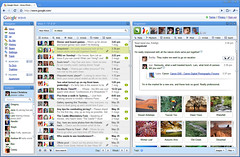Google's Long Shot At Kicking Microsoft Off The Desktop
 I recently described how Google's Wave, a collaboration tool based on the new HTML 5 standard, demonstrates the potential for Web applications to unglue Microsoft's hold on customers. My post quoted Gary Edwards, the former president of the Open Document Foundation, a first-hand witness to the failed attempt by Massachusetts to dump Microsoft and as experienced a hand at Microsoft-tilting as anyone I know.
I recently described how Google's Wave, a collaboration tool based on the new HTML 5 standard, demonstrates the potential for Web applications to unglue Microsoft's hold on customers. My post quoted Gary Edwards, the former president of the Open Document Foundation, a first-hand witness to the failed attempt by Massachusetts to dump Microsoft and as experienced a hand at Microsoft-tilting as anyone I know.
Gary sent me a lengthy email response to that post, filled with technical details that are crucial to understanding the battle for the desktop that is currently unfolding, and kindly gave me permission to excerpt it here. His email touches on a pair of interconnected issues -- the battle between Google and Microsoft, and the odd relationship between Google, Apple and other smartphone vendors. Rather than try to shoehorn all of it into one post, I'll deal with them in two separate posts. This post deals with the Google-Microsoft battle, and the next on the Google/Apple smartphone issue.
Google and Microsoft are in a race for the heart of the desktop, pitting Google's ability to create an API (an interface used to connect disparate systems) that developers can use to tie newly enriched Web applications to desktop PCs, against Microsoft's ability to connect applications like Word to Web-based application servers running on its proprietary code. "Many people mistakenly think that HTML 5 is all about on-line/off-line capabilities. I think you hit the mark in your article pointing out that it's about Web application developers having direct (and Open) access to the same desktop computing processing power Microsoft is able to expose through their proprietary OS/Microsoft Office productivity environment," he wrote.
Microsoft has sought to create a two-tiered Web experience that it pawns off to customers (and trust-busters) as "choice": a bare-bones, standards-compliant format that anyone can use, but which offers an inferior experience, or a rich experience that requires developers write to proprietary standards, which is really no choice at all:
[Microsoft] leaves the choice of Open Web or Microsoft Web to end-users and developers -- knowing full well that integration and high end interoperability with legacy systems is the most cost effective way of advancing productivity.This strategy has been so successful for so long that Google's chances of unseating Microsoft are pretty slim:
The proprietary formats, protocols and interfaces are in place; Web Server side applications, services and systems are shipping; and the Office/Exchange/SharePoint/SQL Server stack has become an unstoppable juggernaut. The client/server integration trump card survived years of anti-trust efforts and open standards compliance demands.But Google does have one opening, and that is the attractiveness of HTML 5-based applications within standards-compliant browsers (which Gary calls "the edge of the Web") -- Google's Chrome, the fastest-growing browser in history, as well as Safari and Firefox, two of the three largest browsers in terms of market share.
Microsoft has lost the battle for the edge of the Web, and with it the all-important graphical document model that very much defines the richness of Web content.This means that Google can seduce developers by offering a superior user experience and a "surging marketshare at the edge of the Web that is dominating everything."
But that's only half the race, as I stated at the outset. Google still has to tie this superior experience to the even more superior processing power of the desktop:
Carving out an x86 [PC] foothold is incredibly important, and must be done if Google apps and services are to be competitive with the next generation of Microsoft Web connected stuff. The appeal to developers has to be more than just compelling API alternatives.I think Google used wave to demonstrate the power of HTML 5, and is counting on developers to do the rest. Gary isn't so sure:
Sometimes I wonder if Google has a grip on it all. Microsoft certainly does. And at this point, there is little room for mistakes by any of the major stakeholders.I think the answer lies with HTML 5-compliant mobile device browsers, a potential gold mine that will attract a tsunami of developers large and powerful enough to rip the sails right off Microsoft's boat. Gary had a lot to say about mobile browsers, and I'll detail that in my next post.